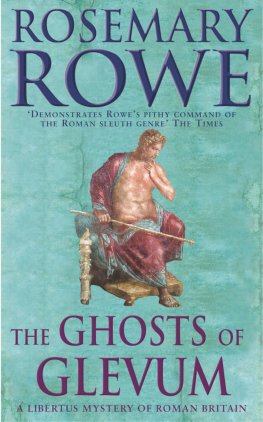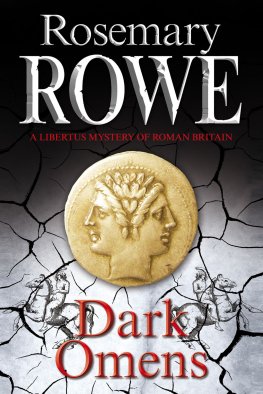Rosemary Rowe - The Ghosts of Glevum
Here you can read online Rosemary Rowe - The Ghosts of Glevum full text of the book (entire story) in english for free. Download pdf and epub, get meaning, cover and reviews about this ebook. year: 2013, publisher: Headline, genre: Detective and thriller. Description of the work, (preface) as well as reviews are available. Best literature library LitArk.com created for fans of good reading and offers a wide selection of genres:
Romance novel
Science fiction
Adventure
Detective
Science
History
Home and family
Prose
Art
Politics
Computer
Non-fiction
Religion
Business
Children
Humor
Choose a favorite category and find really read worthwhile books. Enjoy immersion in the world of imagination, feel the emotions of the characters or learn something new for yourself, make an fascinating discovery.
- Book:The Ghosts of Glevum
- Author:
- Publisher:Headline
- Genre:
- Year:2013
- ISBN:9781472205100
- Rating:3 / 5
- Favourites:Add to favourites
- Your mark:
- 60
- 1
- 2
- 3
- 4
- 5
The Ghosts of Glevum: summary, description and annotation
We offer to read an annotation, description, summary or preface (depends on what the author of the book "The Ghosts of Glevum" wrote himself). If you haven't found the necessary information about the book — write in the comments, we will try to find it.
The Ghosts of Glevum — read online for free the complete book (whole text) full work
Below is the text of the book, divided by pages. System saving the place of the last page read, allows you to conveniently read the book "The Ghosts of Glevum" online for free, without having to search again every time where you left off. Put a bookmark, and you can go to the page where you finished reading at any time.
Font size:
Interval:
Bookmark:
Rosemary Rowe
The Ghosts of Glevum
I
It had been a long banquet. Course after course of exotic food, all disguised to look like something else. The final offering had consisted of a sow and nine suckling piglets, one for each member of the highest table, all made entirely of sweet almond bread and carried in on an enormous wooden plate by an equally enormous Nubian slave. That had earned a round of spontaneous applause, although it proved better to look at than to eat. Now the remains were being cleared away, the acrobats and jugglers had finished, and a dozen slaves were bringing out fresh bowls of watered wine. Loquex, an elderly poet, was ushered in to read.
I sighed. I knew his eulogies of old. Interminable banalities in lamentable verse. I was rather surprised that he had been engaged for such an important occasion, but of course it had all been organised rather hurriedly. Perhaps no one else was available. Loquex was almost overcome by the solemnity of the honour. He produced a depressingly large and densely written scroll of bark-parchment, and cleared his throat.
Marcus Aurelius Septimus, just and fair
Has hooded eyes and curly hair,
he began or words to that effect. (It is impossible to convey the full banality of the original Latin.)
In the obscurity of a corner, I shifted uneasily on my banqueting couch. Others, placed nearer the centre of the room, were forced to endure this without fidgeting. I looked at our host, the Marcus Aurelius Septimus in question: the provincial governors personal representative, and by far the richest and most influential man for miles around. He was also my patron, so I knew him well, and I could already see the look of resignation glazing those hooded eyes, and detect frustration in the way that he was fingering the seal-ring on his hand. It was his own fault, of course; he had engaged the wretched local poet in honour of our two distinguished guests.
Loquex was just turning his attention to them:
Gaius Praxus came from Gaul
Hes very brave and very tall. .
Someone on the second highest table I think it was Balbus, the chief town magistrate, whose brother was rumoured to have served with Praxuss force sniggered, but thought better of it and changed it to a cough. I had every sympathy. Of course, this poem was thrown together hastily for this evening, but Loquex did seem in even worse form than usual.
I glanced at Praxus or Gaius Flaminius Praxus, to give him his full three Latin names. He was tall, one could not deny, but it was not the first word which would spring to mind. Praxus was tall in the way that say a small mountainside is tall and he was brave in much the same way massive, unflinching and immovable, and about as impervious to anything as trivial as pain.
He was reclining at Marcuss right-hand side, in the place of honour, where he was the first to be served with everything as well he might. Praxus had recently been transferred from northern Gaul to find himself, pending the arrival of the new provincial governor, the senior officer commanding most of the Roman forces on the western borders of Britannia, including the garrison at Glevum.
This mountain of a man was improbably dressed in a skimpy pale blue synthesis that fashionable dining robe which was a combination of toga and under-tunic and wore a floral banqueting wreath lopsided around his head.
The effect was utterly incongruous, but Praxus looked no less menacing for that. However, his square-boned face had for a moment lost its scowl and softened to a glazed expression of amused contempt, but whether that was the effect of the verse, or of Marcuss excellent Falernian wine, it was at this distance impossible to tell.
Loquex was just settling into his stride:
And on the left is Mellitus, of course -
Who also earns our thanks and our applause.
I heard a little ripple run round the room at this, and not just at the dreadful quality of the verse. Loquex had clumsily contrived to draw attention to the fact that Mellitus the name means honey, but there was nothing remotely honeyed about his character had been placed on Marcuss left-hand side, in second position to Praxus as it were. Mellitus would not care for that. I recognised him: a wizened little sub-procurator based in nearby Corinium, and the local expert on taxation and finance. He was famous for his grasping hands and shrewd intelligence and had been a guest here once before. At that time Marcus had made an enormous fuss of him, but tonight was obviously different and Mellitus had been demonstrating his discontent by ostentatiously eating and drinking hardly anything, and greeting all the entertainments with a stony face. Now the unfortunate implication of the verse made matters worse. The sharp eyes narrowed more than ever and the thin lips pursed. It was an awkward moment.
Marcus, however, had seen an opportunity and risen to his feet. Taking his cue from our applause he began to clap enthusiastically. I took the hint and did the same, and one by one the other guests joined in.
Loquex coloured, paused, and bowed delightedly at first, but every time the claps and shouts slowed down Marcus began another round (Well done Loquex! What a splendid attempt!) and after a few moments the poet understood. With a look of disappointment he put his scroll away, and still bowing allowed himself to be escorted from the room.
Gaius Flavius, the old ex-councillor seated next to me, gave an approving grunt. Well, lets hope thats the last of the entertainments for the night, so the important people can retire to do some serious drinking, and the rest of us can decently go home. He sighed. Im glad that Im too unimportant to be part of that. Its obvious that those three arent going to get along.
His voice was not loud, but he spoke into a hush, and I was afraid that everyone would hear. He was drawing startled looks from everyone, as it was, by motioning to a slave to fill his cup, and draining it at a gulp. That was shocking behaviour, especially on a formal occasion such as this, but he seemed oblivious. I realised uneasily that hed drunk a great deal of sweet watered wine with the dessert and the alcohol was loosening his tongue.
I murmured something non-committal, and tried to look as if these dangerous remarks were not addressed to me.
He refused to let the matter drop. Its easier for you, Libertus; everybody knows that youre Marcuss protg. And youre a pavement-maker, anyway people need mosaics, whoever is in power. But if those three up there start quarrelling, the rest of us will have to choose between them, and I for one shant know which horse to hitch my chariot to.
If there had been a hush before, there was silence now. You could have heard a breadcrumb fall on to the tiled floor. Even the slave with the watered wine, refilling the old mans goblet for the umpteenth time, paused in his pouring as if turned to stone.
Gaius plunged on, as unstoppable as a runaway cart rattling down a hill. I shall be glad when the new governor is properly installed, and things get back to normal again. He drained his cup and held it out once more. What is the situation there, Libertus, do you know? His speech was getting rather slurred by now. Youve got your ear closer to the ground than most of us. Is it true that there has been yet more delay?
I was aware of twenty pairs of eyes, at least, fastened on me expectantly. Suddenly I wished that I was anywhere but here. The Emperor doubtless had his spies in Glevum, as in every other city of the Empire, and the wrong choice of words could be disastrous. There have been a lot of rumours, Councillor Gaius. . I began.
That was the understatement of the season. Ever since it had been announced that Governor Pertinax had been promoted to the more prestigious African provinces, Glevum had been alive with rumour of all kinds. There were as many versions as there were inhabitants. You could take your pick. There had been a new governor appointed. There had not. Someone had actually set sail for Britannia, but had fallen overboard. Or had been pushed. A man
Font size:
Interval:
Bookmark:
Similar books «The Ghosts of Glevum»
Look at similar books to The Ghosts of Glevum. We have selected literature similar in name and meaning in the hope of providing readers with more options to find new, interesting, not yet read works.
Discussion, reviews of the book The Ghosts of Glevum and just readers' own opinions. Leave your comments, write what you think about the work, its meaning or the main characters. Specify what exactly you liked and what you didn't like, and why you think so.















